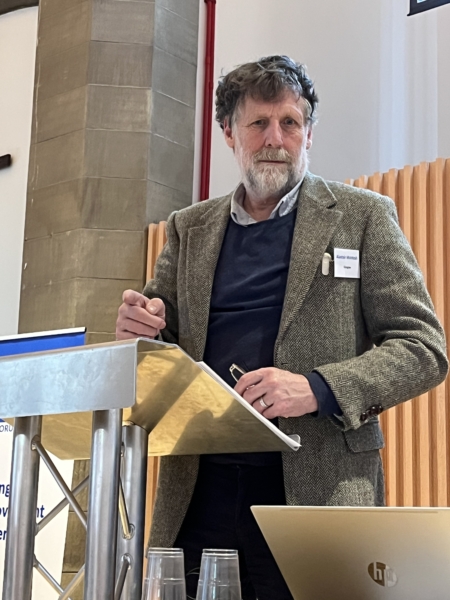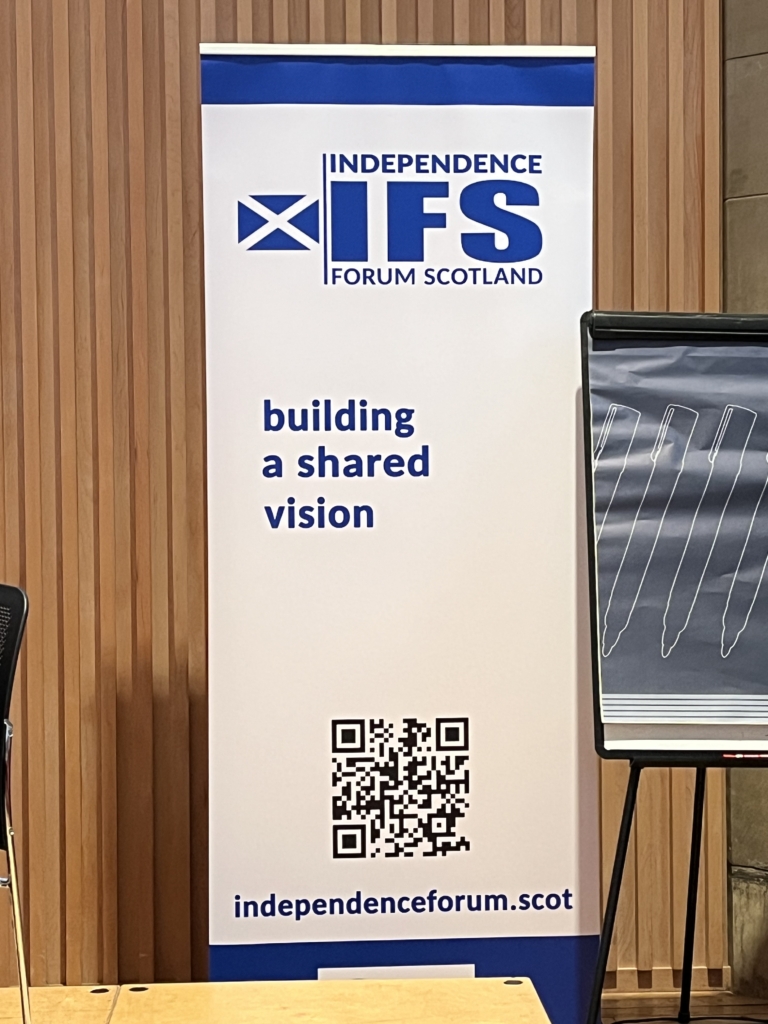The Roots and Vision of a Nation
The Opening Address to the Convention on Scotland’s Future
Greyfriars Charteris Centre, Edinburgh, 1 March 2025
Alastair McIntosh
Good morning.
What does it mean to be a human being?
What does it mean to be in this body, with these people, standing on the solid ground of Scotland’s soil, right now?
I ask, haunted by some lines that Hugh MacDiarmid wrote in 1939:
Scotland’s terrible declension [our terrible decline] is not a defeat on the material plane. Materially, more is with us than against us. We have suffered an appalling reverse because of the incoherence of our meaning. What [we] need above all is a revolution in morale, a return to our roots, a re-discovery of deep realities we have neglected.
“An incoherence of our meaning”! Well might we ask – What is the meaning that gives meaning to meaning?
For me, meaning is a magnetic field that aligns the compass of our lives. It maps out the ground on which, as certain of our own poets have said, “we live, and move, and have our being.” It constellates communities of place, that scaled to be community writ large, make up a nation.
MacDiarmid casts us into deeper questions that belie appearances. Not for nothing did George Elder Davie remind us, in writing on the “democratic intellect”, of “the proverbial phrase metaphysical Scotland”; and as he put it, our tendency for arguments “about material things to turn into rarefied problems of the relation of matter to mind.”

A case in point was the philosopher, James Fredrick Ferrier, born just a little more than a mile north-west from where we sit today and in 1854, author of the seminal Institutes of Metaphysic: the theory of Knowing and Being. Around the same time, he coined the term epistemology for the theory of what does and doesn’t count as knowledge. Very useful, when a Donald Trump turns up!
Two years later, in a paper called Scottish Philosophy: the Old and the New, he pitched this trenchant position. Lend an ear to where Ferrier was coming from.
My philosophy is Scottish to the very core; it is national in every fibre and articulation of its frame. It is a natural growth of old Scotland’s soil … [and] whatever its merit or demerit may be – was born and bred in the country and is essentially native to the soil.
If you are enjoying this article and want to support Bella Caledonia to continue
and thrive, please support our Crowd Funder below, thank you …

With a media owned by billionaires and oligarchs and with your timelines flooded with propaganda, we need independent media more than ever. Help us get to £10k and develop Scotland’s longest-running alternative media project:
What is a Nation?
If such be so, what happens when we lose such roots?
MacDiarmid was not alone in his concern around declension. Adrienne Rich was a poet of Southern Protestant and Jewish heritage. Her essay collection from 1993, What is Found There, reflects on America’s national despair. She suggests it clogs folks’ lives. We see it, worryingly, she said, even “in the political activist who doggedly goes on and on, turning in the ashes of the same burnt-out rhetoric, the same gestures, all imagination spent.”
“The poorer we become the less we remember what we had”, and this loss “can be a leak in history or a shrinking in the vitality of everyday life.”
To be a nation, then, invites MacDiarmid’s “re-discovery of deep realities we have neglected,” and perhaps tellingly, given that his book was about Scotland’s islands, the Gaelic language expresses this through two tightly interwoven cultural terms. Dùthchas, meaning placehood, but to a depth that is geographical, psychological and spiritual; and a correspondingly rich dualchas, meaning peoplehood.
What is it that braids these terms together to start to add up to a nation as community writ large? Well, Ernest Renan hailed from Brittany. He was a pioneering scholar of the poetry of the Celtic peoples, and in 1882, delivered a celebrated address at the Sorbonne. Called Qu’est-ce qu’une nation? – “What is a Nation?” – nine words sum up his theory.
“A nation is a living soul, a spiritual principle.”
A nation comes to be, he suggested, when in the course of history a large aggregation of people, healthy of mind and warm of heart, create “a moral consciousness”. This arises from the willingness of each to abdicate their self-interest “for the good of the community”. And that is what confers legitimacy, a nation’s “right to exist”.
The sharp-eyed might spot the similarity to Rousseau’s “social contract”, by which citizens implicitly compact to advance the common good. But Renan, brief though he is, takes us deeper into metaphysics; and that as a by-word for the spiritual. Both thinkers contrast with Thomas Hobbes. For him, the state (and whatever sense of “nation” might attach to it) is a “Leviathan” – a mighty mechanistic monster – to which a population surrenders its individuality, becoming subjects to a sovereign’s absolute power.
It helps to know that Hobbes was writing during England’s civil wars. Life, as he put it, could be “nasty, brutish and short”, and therefore, prospective subjects might desire a strong-arm king or queen out of their greater fear … of one another! We can see that whereas Hobbes’ took a deficiency view, Renan looked to higher human calling. For Renan: “A nation is then a great solidarity” constituted by the sacrifices of the past, but “summed up in the present by a tangible fact – consent – the clearly expressed desire to live a common life.” That desire, he concluded, is for nothing less than “a perpetual affirmation of life.”

The Need for Roots
If I might remain in Auld Alliance with our Gaulish neighbours, in 1943 the resistance activist Simone Weil, then exiled in London, wrote a report for General de Gaulle’s Free French movement. Published later as The Need for Roots, she set out fifteen fundamental human needs. Without apology, each is “related to the life of the soul”, and in culmination:
Rootedness is perhaps the most important and least known human spiritual need. A human being is rooted through their real, active and natural participation in the life of a collectivity that keeps alive treasures of the past and has aspirations for the future.
Renan might thoroughly have approved, for albeit faced with the exigencies of fascism, her rooted “collectivity” describes a nation. That rootedness in the soil of place gives life, that stretches out its branches to give vision; and whereas history tells us about our past, vision tells us about our future.
Therefore … “Find yer voice Scotland”, wrote the late Kilbirnie poet, Lorna Waite, in Scotia Nova, Tessa Ransford’s and Alistair Findlay’s 2014 anthology of poetry “for a better nation”.
“Learn yer stories / Speak them tae the land / Listen and hear the / Water teach ye”.
Remember … that when Donald Dewar declared those four words on the Mace – Wisdom, Justice, Compassion, Integrity – in re-constituting Scotland’s parliament, he borrowed from Sir Walter Scott: “that only a man with soul so dead could have no sense, no feel for his native land.” The novels of Dostoevsky warn repeatedly that deadness or loss of soul leaves no clear light of reason, but chilling nihilism. As Patrick Kavenagh put it, in a meditation on the Second World War: “The Bedlam of Time is an empty bucket rattled”. And as an ancient voice reminds us also, “Where there is no vision, the people perish.”
For vision issues from the heart’s inner eye. It thaws frost-numbed rationality, and allows reorientation of our sense of meaning to the soul’s magnetic field. That, I believe, is the meaning that gives meaning to meaning. It sets our bearings, and our personal bearing; our presence, our comportment, our carriage. In which respect, note these words in Donald Dewar’s address. “This is about more than our politics and our laws. This is about who we are, how we carry ourselves.”
Inclusive Vision
A bardic or prophetic eye, an eye that’s opened up to vision, helps to protect us from mere ideology. It helps us to refute the xenophobic sense of belonging and identity. Ours must be, if we remember ourselves, “One Scotland; many cultures”; a Scots Internationalism.
This is no new-fangled “wokery”, as some might try to do it down. Going back as far as 1320, our charter text The Declaration of Arbroath extended scripture to proclaim that “there is neither weighing nor distinction of Jew and Greek, Scotsman or Englishman.”
Not “blood and soil”, but “soil and soul”.
In the words of the Historiographer Royal, Professor Christopher Smout, such an accent of the mind renders Scotland “a famous enigma to students of nationalism”; one by which “modern Scottish identity is much more firmly allied to a sense of place than to a sense of tribe.” And in the 19th century Hebrides, Alexander Carmichael noted that, “Fostership was a peculiarly close and tender tie, more close and more tender even than blood.” Thus, such Gaelic proverbs, as “Blood to the twentieth, fostership to the hundredth degree”; or “The bonds of milk [meaning nurture] are stronger than the bonds of blood [or lineage]”.
As I’ve tried to sum it up elsewhere, in Scotland:
A person belongs
inasmuch as they are willing
to cherish and be cherished
by a place
and its peoples
We get ahead of ourselves, we trip up on our own long shadows, if we think that outward structures of law and force alone will build such qualities. I noticed recently that Robin McAlpine, our speaker this morning after Ailsa Raeburn and Laurie Macfarlane, wrote in a newspaper column:
… even the move from caged to free-range eggs – all have one crucial aspect in common. None of them would have happened via politics alone. In all cases, the heavy lifting was done by civil society or citizens themselves.
And as Lesley Riddoch says: Scotland will become independent only if we deepen the qualities of independence … within ourselves. Only if we engage with one another respectfully, patiently, generously, without shouting or name calling, can we hope to swing support for independence from its frustrating 50:50ish yes/no hiatus, to a convincing demonstration of the people’s settled will. Only then, if our aspirations continue to be thwarted from outwith, can we cut to Canon Kenyon Wright’s claim of right. As he put it:
What if that other voice we all know so well responds by saying, “We say no, and we are the state”?
Well we say yes – and we are the people.
Short of the empty bucket rattled of taking up arms, I see no other way, but through the ballot box. It boils down to each of us, to our relations with our colleagues, relatives and neighbours.
Towards Self Determination
I have placed a heavy burden on you in this address, asking that you consider roots, inclusively, for some plants grow from propagation but others blow in by seed. I’ve asked that you consider Scotland’s higher calling: to surmount MacDiarmid’s “terrible declension”, to stop Rich’s “leak in history”, and with Weil to root afresh in Ferrier’s “old Scotland’s soil”.
The Charter of the United Nations rests itself upon “respect for the principle of equal rights and self-determination of peoples.” We alone can be the roots and branches of our self-determination.
Writing The Undiscovered Self just before his death, Carl Jung asked: “Does the individual know that he [and she] is the makeweight that tips the scales?” It is “that infinitesimal unit on whom a world depends.”
Likewise, writing two-and-a half millennia ago, a Chinese sage called Chuang Tzu mapped the way to Tao, the paths of right relationship. Speaking of the qualities of the zhēnrén [sheng ren], the “true man”, the “great soul”, or “the man of calling” (and please adapt the gendering as fits), he asked:
What is meant by a “true man”?
The true men of old were not afraid
When they stood alone in their views.
No great exploits. No plans.
If they failed, no sorrow.
No self-congratulation in success.
They scaled cliffs, never dizzy,
Plunged in water, never wet,
Walked through fire and were not burnt.
Thus their knowledge reached all the way
To Tao.
Can we ask that question of ourselves, of our political servants, and of the nation in its aggregation? For as Lord Sumption wound up the first of his Reith Lectures in 2019: “In a democracy the state is not other. It is not either with us or against us. It is us.”
Secret of the Song
This morning, I have mapped out the metaphysical soil of what it means to be a nation: roots deep in the soil and branches reaching, as a friend from Skye put it, to an urgent cosmic vision to grow upwards.
I leave you with today four compass points.
Have faith! With those of truth and integrity in public affairs, to sing afresh “an auld sang”.
Have faith! With those who stand on solid ground: for “It’s the land, it is our wisdom. It’s the land, it shines us through.”
Have faith! With such as Tartan Heather, a punk-folk bard from Auchinleck, who stands on chill street corners busking: “And ye cannae put a price / put a price on your freedom / For freedom comes from within.”
And with Hugh MacDiarmid, On a Raised Beach … have faith. Because:
The inward gates of a bird are always open
That is the secret of its song
This is what it means to be a human being.
Let this be what it means to be a Scot.
Thank you.
Alastair McIntosh is a Fellow of the Centre for Human Ecology and an honorary professor at the School of Education in the University of Glasgow. His books include Soil and Soul: People versus Corporate Power and Poacher’s Pilgrimage: a Journey into Land and Soul.

Thankyou .
Nice one Alastair.
That was braw!
Thank you for setting out this open and capacious notion of nationhood. It needs constant restating, and deepening, especially in view of the storm clouds gathering on the political horizon. But then the idea of a nation – and indeed that of a community – needs constant reinterpretation and reinvention, if it is not to become ossified by the tales we like to tell ourselves. For to include can also be to exclude: and how we choose to engage with that dialectic, that tension, lies at the heart of how we ‘carry ourselves’. This applies at every level of our daily lives; as for nation and internationalism: to my mind, neither makes any meaningful sense without the other.
I completely agree, Paddy. That is why I cited Christopher Smout and the material about fostership, leading to “One Scotland, many cultures.” The roots to which we have to hold fast and nurture are those of “man to man / the world around / shall brithers be / for a’ that” (quoting from memory), so that we enlarge the tent rather than contract it; and values that give life which we express when we’re at our best achieve that. Whether we are always so good at living up to them is quite another matter, but this is about setting and sustaining our vision. (And it would be very good to see you in person again … it’s been half a century since Aberdeen days … we’re fair cracking on, but still here, “for a’ that”).
The huis wis that cauld
the mice hud moved next door.
I missed the wee mice
tearing across the floor.
This is beautiful and uplifting, soothing for much that ails us and inspiring for what could be gained here in this place of so much potential
I will read it again and again for it vividly describes the things I feel but have not had the words or skill to give shape.
Thank you for publishing.
Thank you so much Allistair. That is uplifting after putting so much work into it, and Mike kindly publishing it here on the Bella site. I just think that with Scotland’s future and so much of life these days, we have to dig from where we stand a whole lot deeper than we have done in most political discourse of recent years. I suspect a lot of folk who may have gone rather quiet might be on that journey. Such wee white blossoms can take time to open. Go well.